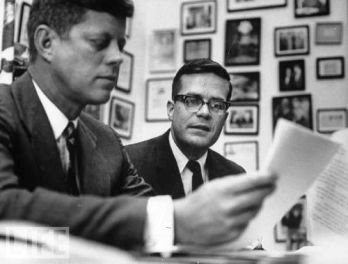“I still believe that the mildest and most obscure of Americans can be rescued from oblivion by good luck, sudden changes in fortune, sudden encounters with heroes. I believe it because I lived it.”

Those words come from Ted Sorensen, advisor, counselor and speechwriter for President John Kennedy. Sorensen died Sunday at the age of 82.
In 1961, I clearly remember sitting in my 8th grade homeroom class and watching on television President Kennedy’s inaugural address. The teacher pointed out the words that would eventually become emblematic of the new administration.
“Ask not what your country can do for you, ask what you can do for your country.”
In his autobiography, Counselor, Sorensen reveals that he “drew on the Bible, the Gettysburg Address and the words of Thomas Jefferson and Winston Churchill,” The New York Times wrote, “as he helped hone and polish that speech.”
Among the most memorable of those lines:
“Let the word go forth… that the torch has been passed to a new generation of Americans.”
“Let every nation know… that we shall pay any price, bear any burden, meet any hardship, support any friend, oppose any foe, in order to assure the survival and the success of liberty.”
“For only when our arms are sufficient beyond doubt can we be certain beyond doubt that they will never be employed.”
“All this will not be finished in the first 100 days. Nor will it be finished in the first 1,000 days, nor in the life of this Administration, nor even perhaps in our lifetime on this planet. But let us begin.”
“You need a mind like Sorensen’s around you that’s clicking and clicking all the time,” Richard Nixon said in 1962, adding that Sorensen had “a rare gift.”
Ted Sorensen’s gift was crafting words that were both aspirational and inspirational; words that went straight to the heart of the American people. But it was more. It was Sorensen’s feeling behind those words that gave them power.
During those critical thirteen days during the Cuban missile crisis, Sorensen drafted Kennedy’s televised address to the American people (as well as the Russian leadership) explaining the situation and the country’s stance in clear, unambiguous language.
“It shall be the policy of this nation to regard any nuclear missile launched from Cuba against any nation in the Western Hemisphere as an attack on the United States, requiring a full retaliatory response upon the Soviet Union.”
Kennedy lays out his plan:
“To halt this offensive buildup, a strict quarantine on all offensive military equipment under shipment to Cuba is being initiated. All ships of any kind bound for Cuba from whatever nation and port will, if found to contain cargoes of offensive weapons, be turned back. This quarantine will be extended, if needed, to other types of cargo and carriers. We are not at this time, however, denying the necessities of life as the Soviets attempted to do in their Berlin blockade of 1948.”
More than that, it was Ted Sorensen who translated Kennedy’s resolve and willingness for peace in a series of letters to Chairman Khrushchev which ultimately defused the crisis.
“At our meeting in Vienna and subsequently, I expressed our readiness and desire to find, through peaceful negotiation, a solution to any and all problems that divide us. At the same time, I made clear that in view of the objectives of the ideology to which you adhere, the United States could not tolerate any action on your part which in a major way disturbed the existing over-all balance of power in the world…
“I hope that your Government will refrain from any action which would widen or deepen this already grave crisis and that we can agree to resume the path of peaceful negotiations.”
Considering the contentiousness inhabiting Washington today, politicians – both newly elected and re-elected – would do well to consider Sorensen’s purposeful words from Kennedy’s Inaugural:
“Let us never negotiate out of fear. But let us never fear to negotiate.”
We need that kind of strength. We need that kind of commitment.
Comments










